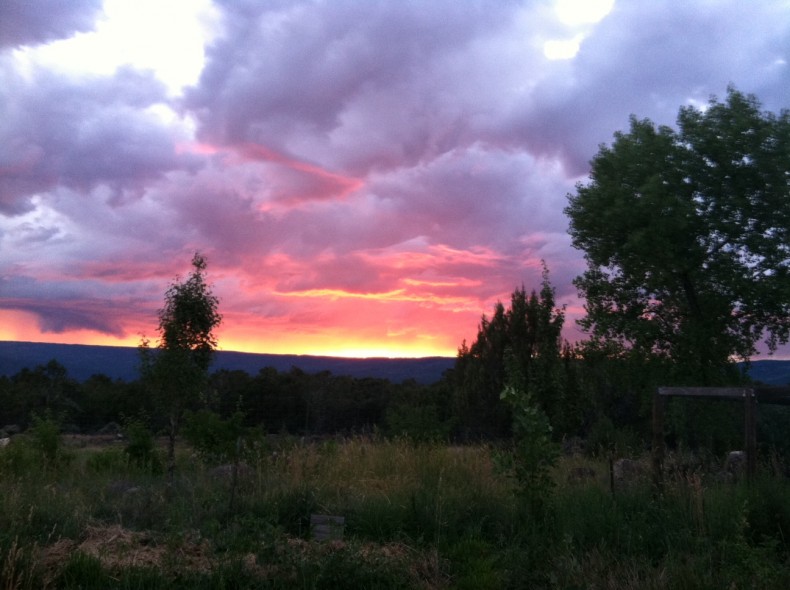During the summer and fall, my husband and I spend most of our evenings sitting on the front porch, drinking a glass of wine and watching the sun move across the sky and below the horizon. The light show unfolds differently each time and cannot be binge-watched or replayed. It can only be fully experienced in the here and now, and that’s where we sit and savor it.
This time of year, we often have the pleasure of sharing our evening ritual with friends, and today I’d like to take a moment to remember and honor a friend who taught me how to appreciate the importance of these simple moments. I first told the story here in August of 2011, and I’m sharing it again now, because it’s a lesson whose significance never fades.

Lately, I’ve been thinking about the nature of knowledge and how we acquire it. My training as a scientist taught me to revere the scientific method, and I continue to hold science in the highest regard. Science can teach us much about the world and ourselves, and as I’ve written elsewhere, it can allow us to see beyond our biases — if we can keep open minds.
Yet I’ve grown to understand that not all knowledge worth possessing can come from a book, an experiment or a Google search. Science is very good at answering questions that involve quantifiable elements — how far away is that planet? Which drug produces the best response? But it’s less helpful at answering some of life’s most vexing questions like, what should I do with my life? Where should I focus my attention?
Two years ago this month I discovered an answer to a question I hadn’t thought to ask — how should I spend a summer afternoon? I present my found answer here, in the form of a letter — a tribute to a friend I hardly knew, but will never forget.
As If: A letter to Chris Dourley
August, 2009
I arrived at your house with a book tucked under my arm, a little something to express my support. As if words could cure what doctors couldn’t. I did not yet understand that it was you, my dying friend, with the gift to bestow and me its fortunate recipient that early August afternoon.
We sat on your porch and watched the rain clouds roll in over the West Elk Mountains, and I said that I had not yet climbed Mount Lamborn. You reminisced about your many journeys up and down the mountain’s steep slopes and offered me an introduction to your old friend. You pointed to the gully I should ascend, and told me which ridge to choose for the climb to the summit.
Looking further east, I remarked how striking the Ragged Mountains appeared from this vantage point and you told me how the sun, as it followed its daily arc across the sky, would cast shadows on the cliff faces in patterns that only someone who had spent many early mornings, afternoons, and lazy evenings observing could fully appreciate. You told me about discovering this patch for the first time more than 20 years ago and your surprise that no one else wanted this mesa top at the end of a bumpy dirt road where you had found your life place.
With a twinge of envy, I told you how I longed to be one of those people who belonged to a place like that, who’d made it my own through devotion and the passing of time.
You nodded knowingly and then we quietly sat back and watched the storm clouds wash over the mountains. And as we listened to raindrops drum a gentle rhythm on the tin roof above the porch, I felt consumed with gratitude that you’d shared this moment of grace with me, thankful for having borne witness to this ephemeral pause when we could forget that you were dying and lose ourselves in the comfort of an ordinary afternoon.
As if these unremarkable events from which we piece our lives together could go on forever.
As if the beauty of the here and now could suspend us.
As if this moment could protect us from what’s to come.
*Sunset photo by Christie Aschwanden
I could feel the calm and serenity as I read this. Great story!
This is beautiful, Christie.
A former pastor, now retired, gave a sermon (“Why Is the Sky Blue?” I think) several years ago that echoed the first couple of paragraphs above. The message was essentially that science gives us the how, and does so wonderfully; for the why, we have to turn to philosophy, or spirituality, or, perhaps, the arts. I remember it as being a calming sermon, as this is calming.
beautiful, Christie, and thanks for this lovely reminder of dear Chris